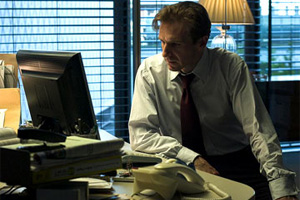|
 |
The Constant Gardener (2005)
Focus Features, 2 hrs. 10 mins.
Starring:
Ralph Fiennes, Rachel Weisz, Danny Huston, Billy Nighy, Pete
Postlethwaite, Gerard McSorley, Donald Sumpter, Hubert Kounde, Archie
Panjabi
Directed by:
Fernando Meirelles |
|
Brazilian filmmaker Fernando
Meirelles (City of God) concocts a lavish landscape of global intrigue set
against the majestic Kenyan skies in the astoundingly gripping conspiracy
thriller The Constant Gardener. Thoroughly captivating in its grand
presentation, Meirelles weaves an absorbing story that cleverly consists
of three interesting factors: an edge-of-your-seat thriller, a soothing
romance drama and an international political potboiler.
Meirelles, with the assistance of cinematographer Cesar Charlone’s
generous camera, lends The Constant Gardener its exquisite allure with
Kenya’s keenly breathtaking atmosphere and the English influence that
overseas this vivid African haven. The noteworthy performance courtesy of
the prolific cast stimulates and holds together this film with a definite
punch. Overall, Meirelles handles his intoxicating and beautifully shot
narrative with effortless flair.
Based on the moving novel by John le Carre, The Constant Gardener is a
passionate tale that raises more questions and spotlights the corruptive
elements behind indifferent governmental bureaucracy. British High Command
diplomat Justin Quayle (Ralph Fiennes) is stationed in Africa and enjoys
his leisurely hobby of tending to his precious garden. Soon, his life will
come to a stand still when tragedy strikes concerning his beloved activist
wife Tessa (Rachel Weisz). We learn that Tessa perished in northern Kenya.
But the question remains: was Tessa’s deadly fate a planned murder and if
so who is behind the cover-up? After all, Tessa has been known to make
some hasty waves when crusading for the questionable treatment of the
vulnerable Kenyan people.
Understandably, Justin sets out to inquire about his late wife’s demise.
Thankfully, he has the full support of his reliable friend and diplomatic
colleague Sandy Woodrow (Danny Huston). As Justin digs deeply into the
background static involving Tessa’s death, he learns about how involved
she was in the struggle to reveal the truth behind the manipulation of the
impoverished Kenyan population. From visiting squalor-induced villages
with a black doctor (Hubert Kounde) to freely speaking out about the
injustices done, Tessa was instrumental in bringing to the surface all the
cheap-minded tactics being calculated by the shifty government. Of course
the biggest revelation was Tessa’s persistence in sniffing out the sordid
truth involving beneficial drug companies testing their products on the
slum area people as if they were ready-made Third World guinea pigs.
Interestingly, Justin is shocked yet amazed by Tessa’s commitment to
expose the governmental wrong-doing. Despite her insubordinate activities
that could jeopardize his aristocratic positioning, Justin is
overwhelmingly proud of Tessa and realizes that he never really knew what
kind of determined woman he married in the first place. His “discovery” of
Tessa’s unbridled passion for highlighting the inequities of these
disadvantaged folks is refreshingly reinforced and he literally falls for
her even more emotionally now that she has gone. However, it’s getting hot
in the kitchen and Justin is soon warned to back off a bit if he knows
what’s good for him in the long run. Justin’s loyal buddy Sandy and fellow
diplomat (Bill Nighy) is quite concerned about his self-imposed
investigation. Also, a disgruntled company owner (Gerard McSorley) and
resident spy (Donald Sumpter) hope to silence Justin by convincing him to
bury the memories of his late wife’s trouble-making tendencies.
As a visionary moviemaker, Meirelles has helmed a provocative film
enriched in political amorality, eloquence and intelligence. As with his
impressive film debut in the aforementioned City of God, Meirelles knows
how to manipulate the feelings concerning oppressive poverty and the
corporate cruelty that underlines the unfairness of the overall
circumstances. The Constant Gardener is stark and bleak in its message yet
there’s something poetic and lyrical about the war on the innocent while
the mighty has no boundaries in terms of its relentless grasp. Certainly
there’s some nobility about Meirelles’ romanticism about a masterfully
scenic continent being raped by the selfish ideology of opportunistic
outsiders.
Although there is an unblinking complexity about the socio-political
climate that smothers this fetching African campus, the amazing result is
that Gardener radiates as a simplistic love story in which its
participants pay a dearly price. Fiennes gives a restrained performance
that could have been unwisely animated and preachy. Instead, the actor
astutely wears his heart on his sleeve and lets the bittersweet aftermath
dictate his inner turmoil. Weisz has never been more solid as the
motivating mouthpiece that insists on curtailing the chaos that seems
never-ending to the poor people.
Bottom line: The Constant Gardener is an exceptional film that juggles so
many sentiments as a harsh commentary on the way we submerge the pride and
prosperity of a cultural people as well as the need to embrace our own
insecurities and ignorance. |